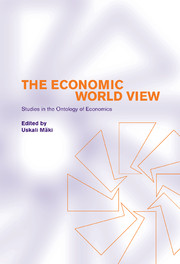Book contents
- Frontmatter
- Contents
- Notes on the contributors
- Preface
- I The what, why, and how of economic ontology
- II Rationality and homo economicus
- 4 The normative core of rational choice theory
- 5 The virtual reality of homo economicus
- 6 Expressive rationality: is self-worth just another kind of preference?
- 7 Agent identity in economics
- 8 Chances and choices: notes on probability and belief in economic theory
- Part III Micro, macro, and markets
- Part IV The world of economic causes
- Part V Methodological implications of economic ontology
- Name index
- Subject index
6 - Expressive rationality: is self-worth just another kind of preference?
Published online by Cambridge University Press: 04 August 2010
- Frontmatter
- Contents
- Notes on the contributors
- Preface
- I The what, why, and how of economic ontology
- II Rationality and homo economicus
- 4 The normative core of rational choice theory
- 5 The virtual reality of homo economicus
- 6 Expressive rationality: is self-worth just another kind of preference?
- 7 Agent identity in economics
- 8 Chances and choices: notes on probability and belief in economic theory
- Part III Micro, macro, and markets
- Part IV The world of economic causes
- Part V Methodological implications of economic ontology
- Name index
- Subject index
Summary
Introduction
People commonly reflect on what they do and these reflections give rise to feelings of self-worth, or sometimes the reverse when feelings of shame, guilt and embarrassment are experienced. It seems plausible to think that these feelings, or their anticipation, influence action in some way or another. Indeed, I take it for granted that, roughly speaking, people act in ways which encourage a sense of self-worth. This paper is concerned first with whether the conventional account of action as instrumentally rational offers a way of understanding such feelings and their connection to action. Action in the instrumental model is undertaken to satisfy preferences (or it conforms to a preference ordering) and it might be natural to think of self-worth as just another kind of preference which motivates people to act (or it is built in to a preference ordering). However, I argue in the next section that action which supports self-worth cannot be readily or easily subsumed within that model because self-worth cannot be reduced to some kind of preference.
Does this matter? Since no simple account of action could hope to capture exhaustively what makes people tick, it is not self-evident that the failure in this regard necessarily tells against the mainstream reliance on the instrumental model. However, in the third and fourth sections, I argue that the failure to include the reflective capacities which are responsible for the generation of self-worth in the ontology of economics does important damage to mainstream economics. In particular, it leads to an impoverished understanding of the three classic games of social and economic life: the prisoner's dilemma, the coordination and the battle of the sexes game.
- Type
- Chapter
- Information
- The Economic World ViewStudies in the Ontology of Economics, pp. 98 - 113Publisher: Cambridge University PressPrint publication year: 2001
- 4
- Cited by

